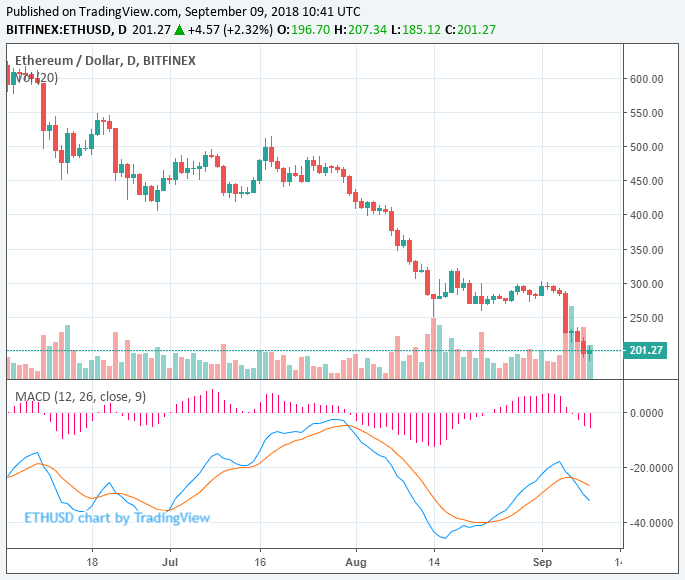Earlier today, on September 9, the price of ETH, the native cryptocurrency of Ethereum, fell to its yearly low at $185.

While ETH has rebounded above the $200 mark after an unforeseen recovery of Bitcoin from $6,190 to $6,450, since July, ETH has seen a steeper decline in value than other major cryptocurrencies.
How Much is it Due to ICO Sell Off?
In late 2017, the price of ETH surpassed the $1,500 mark and investors of ERC20 tokens on the Ethereum protocol achieved 10 to 100-fold returns from their initial coin offering (ICO) entry.
Investors in tokens like EOS, Ontology, ICON, Zilliqa, and 0x had seen massive gains in late 2017, at the peak of the cryptocurrency market.
But, in the past few months, the price of ERC20 tokens have fallen substantially against Bitcoin, which has also experienced a 70 percent fall against the US dollar. Ontology and ICON have seen 75 to 80 percent losses against Bitcoin, losing out by more than 95 percent against the US dollar.
The majority of analysts in the cryptocurrency sector have attributed the decline in the price of ETH to the sell off of ERC20 blockchain projects that have raised millions of dollars in ETH in their token sales.
As the price of ETH started to fall and the cryptocurrency market entered a major bear market, analysts have said that ERC20 projects started to sell their ETH holdings, causing ETH to experience a more intense downtrend than other major cryptocurrencies.
It is evident that the decision of ERC20 projects on Ethereum to sell large amounts of ETH in panic largely contributed to the downtrend of ETH.
Can it be Prevented in the Future?
Earlier this week, Augur co-creator Joey Krug responded to some of the criticisms made by investors in the cryptocurrency community on the decision of the Augur team to sell ETH at $0.7 to fund the operation of the project.
Krug stated that Augur sold all of the ETH it raised in its token sales immediately after its ICO to fund its development, adding that Augur is not a hedge fund but a project working to create a sophisticated decentralized system.
If Augur had sold its holdings as ETH reached $1,000 in late 2017, instead of $700,000, Augur could have raised a billion dollars.
But, as Krug emphasized, investors in the ICO market do not provide capital to blockchain projects to operate as hedge funds but to maximize their resources to create a successful decentralized application or protocol.
Linda Xie, 0x advisor and Scalar Capital co-founder, said that her team has been advising projects to liquidate their ETH upon their token sale to fund operations.
“You and the Augur team did the right thing and I have been advising projects to do the same. It’s easy to view all of this in hindsight as the price of ETH could have easily gone the other way while you were building,” Xie said.
The massive sell off of ETH initiated by ICOs occured because ICOs wanted to avoid missing out on a rally like Augur did in 2016. But, not only is it extremely difficult to measure the peak and bottom of assets, investors did not raise millions of dollars for ERC20 projects to trade and invest in the cryptocurrency market.
The approach of Augur, Xie, and other prominent projects, investors, and accelerators to prevent blockchain projects from operating like hedge funds to open-source developer communities could prevent an intensified downtrend for ETH in the future.
Featured image from Shutterstock. Charts from TradingView.
Follow us on Telegram or subscribe to our newsletter here.
• Join CCN’s crypto community for $9.99 per month, click here.
• Want exclusive analysis and crypto insights from Hacked.com? Click here.
• Open Positions at CCN: Full Time and Part Time Journalists Wanted.








